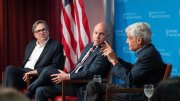A team of researchers at the Harvard T. H. Chan School of Public Health (HSPH) say they have discovered circumstantial evidence showing that multiple sclerosis is caused by infection with the Epstein-Barr virus. The research was published online today in the journal Science.
Multiple sclerosis (MS) is a disease in which the immune system attacks the protective sheaths that cover nerve fibers, leading to muscle weakness, numbness, pain, fatigue, loss of coordination and balance, and other symptoms. The disease, which is incurable, affects 2.8 million people worldwide. But if the HSPH findings prove correct, it might be possible to prevent MS, either by developing a vaccine against the Epstein-Barr virus (EBV) or by developing antiviral drugs to treat EBV infection.
Alberto Ascherio, professor of epidemiology and nutrition and senior author of the study, has been investigating the hypothesis that Epstein-Barr virus causes multiple sclerosis for several years. But establishing a causal relationship between the two ailments has been difficult because EBV infects most adults (many with no obvious sign of illness), MS is relatively rare, and the symptoms of MS typically begin a decade after EBV infection.

Animation showing dissemination of MS patient brain lesions as illustrated by monthly MRI images taken during the course of a year.
Image in the public domain
To detect the connection between the two diseases, the researchers analyzed blood samples taken every other year from 10 million current and former active-duty U.S. servicemen and -women, and identified 955 who were diagnosed with MS during their military service. By analyzing samples of these patients’ blood before they became ill, the scientists were able to determine that the risk of developing MS increased 32 times after infection with EBV, but not after infection with any other viruses.
While the study doesn’t prove causality, or describe a mechanism by which EBV leads to MS [UPDATED JANUARY 26, 2022 to describe a causal mechanism uncovered by researchers at Stanford—see below], it is large enough and the association strong enough that it may spark EBV vaccine development. It is even possible, says Ascherio, that “EBV-specific antiviral drugs could ultimately prevent or cure MS.” Other Harvard researchers who contributed to the study include former assistant professor of epidemiology Michael Mina, research scientists Kjetil Bjornevik, Marianna Cortese, and Kassandra Munger, Mendel professor of genetics and of medicine Stephen Elledge, and associate professor of neurology Brian C. Healy.









